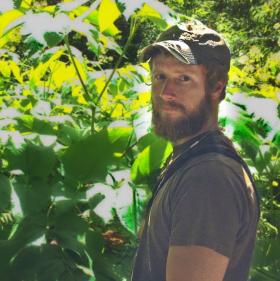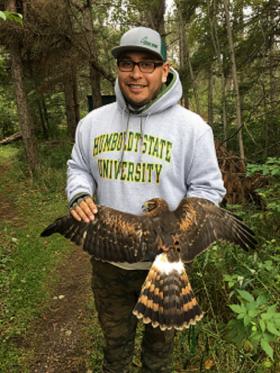Breadcrumb
Careers & Alumni
Cal Poly Humboldt Wildlife students leave a highly reputable program with the knowledge and skills to pursue several meaningful careers, especially within the discipline.
According to a survey of alumni, 86 percent of our graduates work in a position related to wildlife.
In fact, many are wildlife biologists in the field for state and federal natural resource agencies such as the U.S. Fish and Wildlife Service, California Department of Fish and Wildlife, and the National Park Service. Others work for conservation organizations (like the Wildlife Conservation Society, Ducks Unlimited, or The Nature Conservancy), private ecological consulting firms (such as HT Harvey & Associates), private timber companies (such as the Green Diamond Resource Company), and zoos and wildlife rehabilitation centers.
Whether you’re in the workforce or decide to pursue a higher degree, you’ll be part of a group of Wildlife alumni who stay connected and engaged through the Western Section of the Conservation Unlimited Alumni Association.
Here are a few possible careers:
- Wildlife Biologist
- Wildlife Refuge Manager
- Wildlife Program Specialist
- Wildlife Manager
- Special Agent - Wildlife
- Fish & Game Warden
- Shooting Preserve Manager
- Fish & Wildlife Assistant
- Wildlife Technician
- Animal Biologist
- Animal Handler
- Animal Keeper
- Zoologist
- Fisheries Biologist/Technician
- Research Biologist
- Rangeland Management Spec.
- Range Technician
- Soil Conservationist
- Soil Scientist
- Soil Technician
- Customs Inspector
- Wildlife/Environmental Consultant
- Terrestrial Biologist
- Outdoor Recreation Planner
- Conservation Officer
- Wilderness Ranger
- Park Ranger/Park Tech.
- Naturalist
- Environmental Education Instructor
- Natural Resource Specialist
- Recreation Specialist
- Agriculture Research Worker
- Lab Technician
- Wetlands Biologist
- Wetlands Restoration Specialist
Marketable Skills
Communication
- Technical report writing
- Working as part of a team
- Media & public relations
- Public speaking
Computer Skills
- Developing spreadsheets
- Working with statistical packages
- GIS-ArcView, Arclnfo
Recording & Interpreting Data
- Measuring, computing, monitoring, inspecting, collecting, identifying and classifying data
- Evaluating environmental contaminants
- Using logic and scientific methods
- Designing data collection methods
Technical Skills
- Knowledge of plant and animal ecology
- Techniques in wildlife management, wildlife habitats, and wildlife population ecology
- Conducting population surveys
- Trapping, banding, marking and preserving specimens
Alumni Updates
Terry Bowyer
Wildlife, 1970
R. Terry Bowyer, B.S. 1970, M.S 1976, is the 2025 recipient of the Aldo Leopold Memorial Award from The Wildlife Society for outstanding contributions to wildlife conservation , the highest honor that the Society bestows.
Aidan Branney
Wildlife, 2018
After earning his bachelor's degree in Wildlife in 2018 and completing a master's in Range and Wildlife Management at the Caesar Kleberg Wildlife Research Institute at Texas A&M University Kingsville in 2022, he is now pursuing his PhD at the University of Georgia-Athens. His dissertation research will revolve around lion spatial ecology and predator-prey dynamics in Etosha National Park, Namibia. This summer, he will begin data collection and monitor lions via GPS collars and trail cameras in and outside the National Park. The wildlife program at Humboldt set him up in the best possible way to pursue wildlife research across species and the world.
Danial Nayeri
Wildlife, 2023
After earning his master’s degree in Wildlife from Cal Poly Humboldt, Danial moved to College Station, Texas, to begin a new journey as a Ph.D. student. Danial is currently a research graduate assistant at Texas A&M University, working in the Human Dimensions of Natural Resources Lab under the supervision of Dr. Gerard Kyle. Danial's research focuses on human-wildlife conflict mitigation through the lens of social psychology. His experience at Humboldt helped shape him into a more competent and prepared graduate student.








